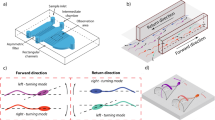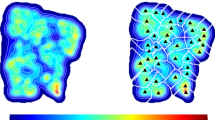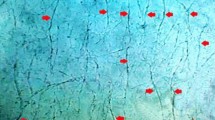Abstract
SPERMATOZOA are usually thought to swim in random directions in their suspending medium, seminal plasma, sea water, Krebs–Henseleit–Ringer solution, etc., unless, as in the spermatozoa of many plants and, possibly, some animals, chemotaxis occurs naturally or is induced. The hypothesis of random sperm movement has, in fact, been the basis for a quantitative study of the block to polyspermy in sea-urchin eggs, the spermatozoa being treated as gas molecules which obeyed the classical kinetic theory of gases1.
This is a preview of subscription content, access via your institution
Access options
Subscribe to this journal
Receive 51 print issues and online access
$199.00 per year
only $3.90 per issue
Buy this article
- Purchase on Springer Link
- Instant access to full article PDF
Prices may be subject to local taxes which are calculated during checkout
Similar content being viewed by others
References
Rothschild, Lord, and Swann, M. M., J. Exp. Biol., 26, 164 (1949).
Author information
Authors and Affiliations
Rights and permissions
About this article
Cite this article
ROTHSCHILD Non-random Distribution of Bull Spermatozoa in a Drop of Sperm Suspension. Nature 198, 1221–1222 (1963). https://doi.org/10.1038/1981221a0
Issue Date:
DOI: https://doi.org/10.1038/1981221a0
This article is cited by
-
Hydrodynamical characteristics of a pair of elliptical squirmers in a channel flow of power-law fluids
Rheologica Acta (2024)
-
New insights into sperm rheotaxis, agglutination and bundle formation in Sharkasi chickens based on an in vitro study
Scientific Reports (2022)
-
Curvature in the reproductive tract alters sperm–surface interactions
Nature Communications (2021)
-
Experimental measurements of the sinking speed of sperm of an acroporid coral, Acropora tenuis, in static seawater
Journal of Oceanography (2020)
-
Re-entrant bimodality in spheroidal chiral swimmers in shear flow
Scientific Reports (2018)
Comments
By submitting a comment you agree to abide by our Terms and Community Guidelines. If you find something abusive or that does not comply with our terms or guidelines please flag it as inappropriate.



